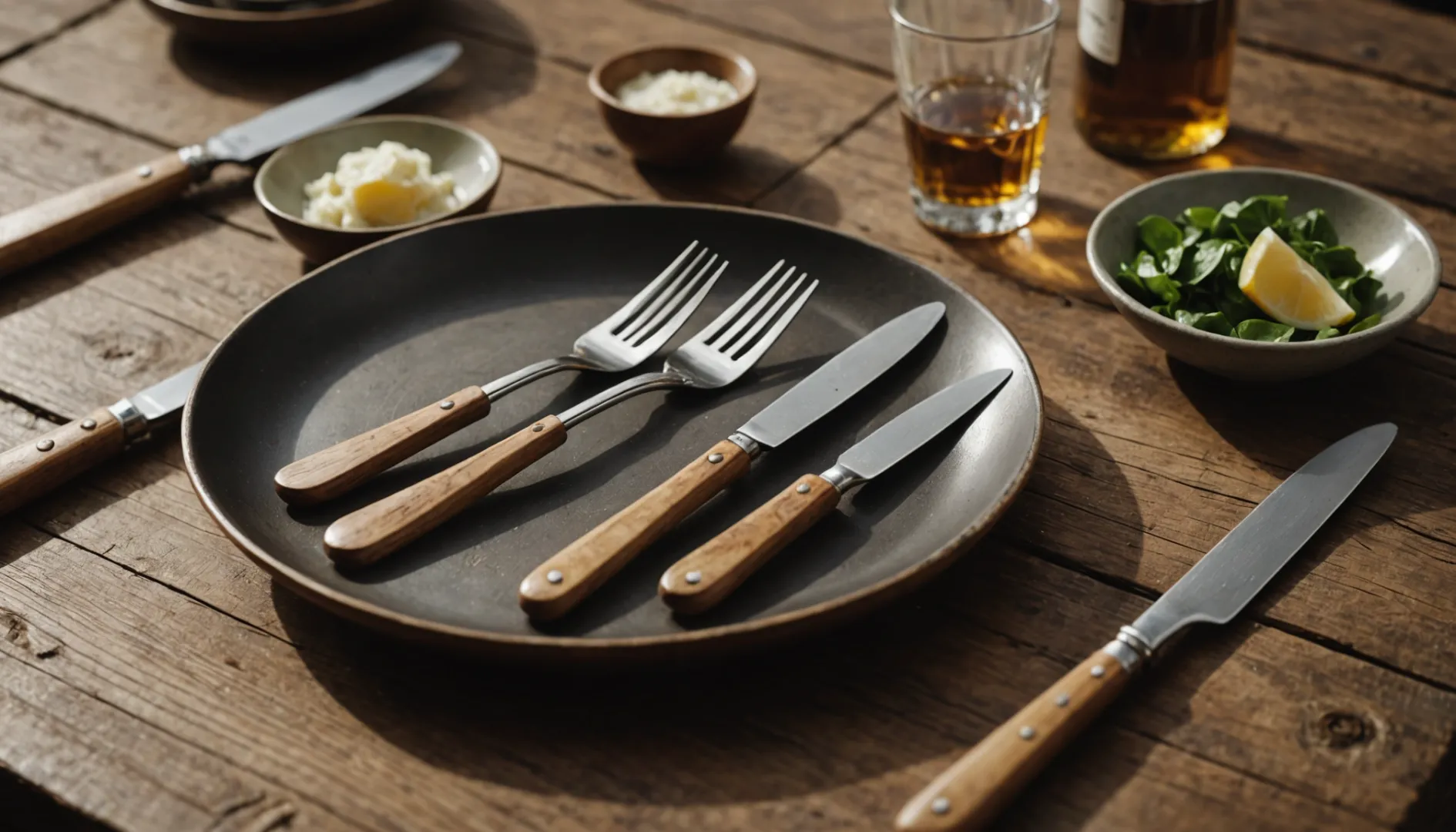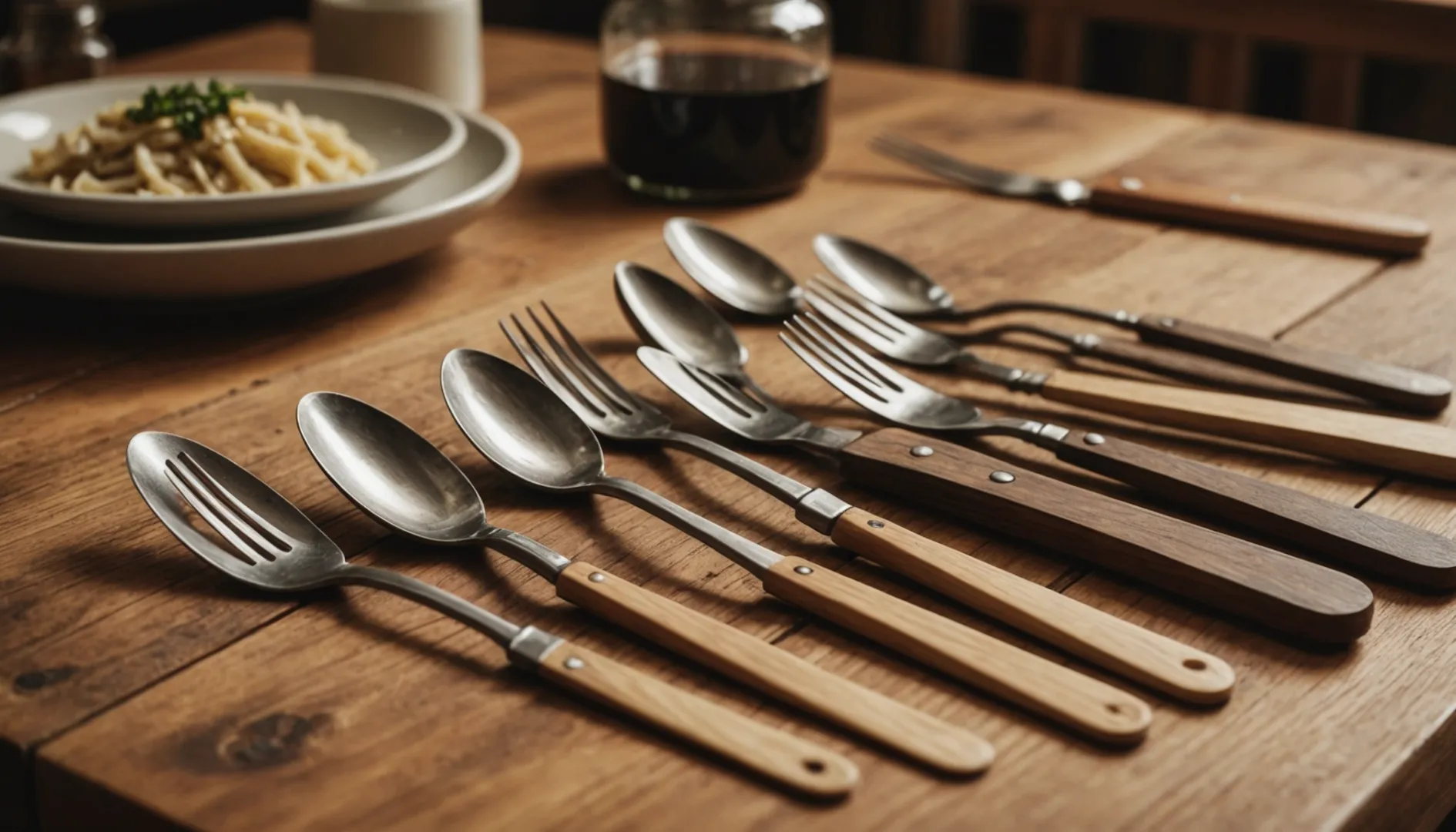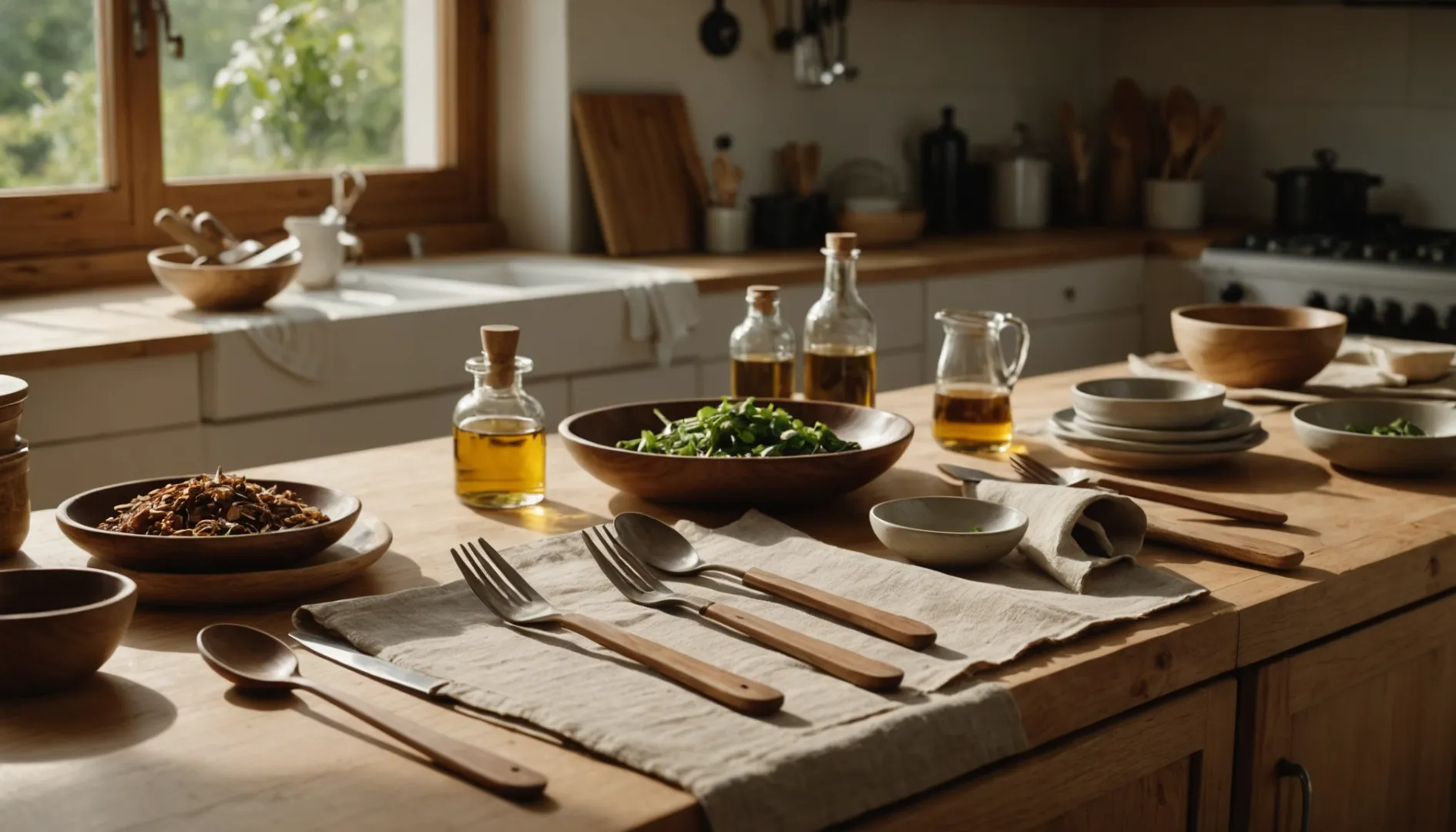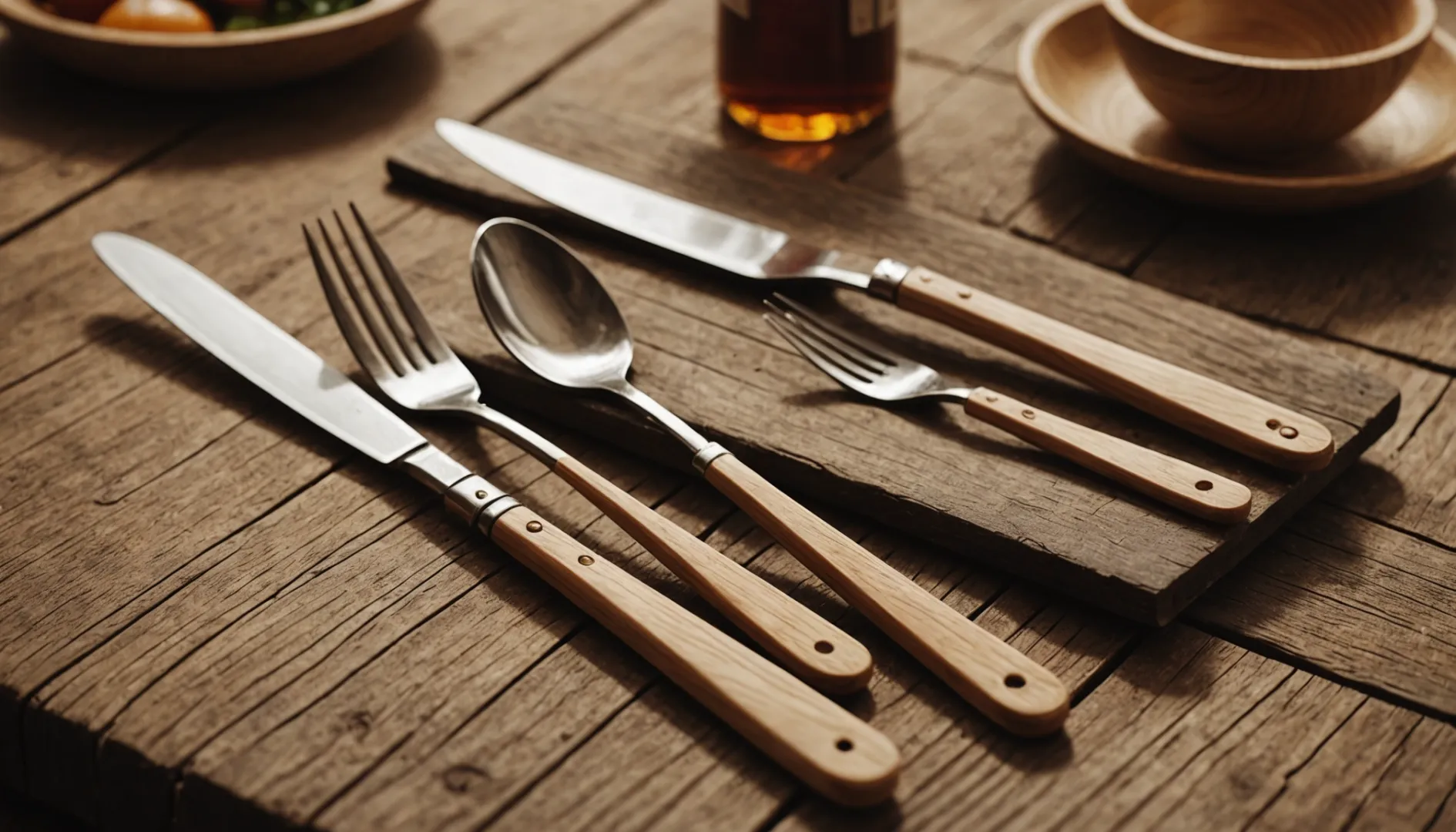
Ever wondered if you could safely reuse those wooden forks and spoons? Let's dive into the dos and don'ts of giving disposable wooden cutlery a second life!
Yes, you can safely reuse disposable wooden cutlery if you clean and maintain it properly. Due to its porous nature, thorough washing and drying are crucial to prevent bacterial growth. While these utensils are more eco-friendly than plastic, ensuring their safety requires careful handling.
So there I was, staring at a pile of used wooden forks after a family picnic, wondering if they could be saved from the trash heap. I've learned that keeping these utensils clean is key to not only extending their lifespan but also maintaining hygiene. In the next sections, I'll share the best ways I've found to keep your wooden cutlery both safe and functional for future use.
Wooden cutlery is more hygienic than plastic.False
Wooden cutlery can harbor bacteria if not properly maintained, unlike plastic.
Wooden cutlery is biodegradable and eco-friendly.True
Wooden utensils decompose faster than plastic, making them more sustainable.
What Are the Hygiene Risks of Reusing Wooden Cutlery?
Imagine enjoying a picnic with wooden cutlery, savoring both nature and sustainability. But what lurks beneath the surface of these eco-friendly utensils?
Wooden cutlery, though eco-friendly, can harbor bacteria due to its porous nature. To reduce hygiene risks, it's essential to clean, dry, and maintain them with food-safe oils regularly. Avoid exposing them to moisture and high temperatures to prevent bacteria growth and structural damage.

The Porous Nature of Wood
I remember the first time I used wooden cutlery at a family gathering. It was charming and felt natural in my hands. But I learned the hard way that its porous nature can be a hidden challenge. Wooden utensils can absorb moisture, creating a cozy home for bacteria. Those tiny pores can trap remnants of last night’s pasta sauce or today’s salad dressing, setting the stage for bacterial growth.
Proper Cleaning and Maintenance
After my wooden cutlery revelation, I became almost ritualistic in my cleaning routine. I now hand wash them with mild soap and warm water, avoiding the temptation to let them soak. I've found that drying them thoroughly is crucial—leaving them damp is like sending an open invitation to bacteria. Regularly conditioning them with food-safe oils or waxes helps seal those little pores, keeping them less inviting to moisture and microbes.
Risks of Prolonged Use
I've noticed that with frequent use, my wooden spoons start to lose their luster. It turns out that as the natural finish wears off, they become even more susceptible to moisture and bacteria. So, I've made it a point to reapply natural coatings like beeswax every so often. Plus, I avoid leaving them near hot stovetops or in dishwashers to prevent drying out and cracking.
Considerations for Eco-Conscious Consumers
Choosing sustainability is important to me, which is why I’ve leaned towards wooden cutlery1. But balancing that with hygiene is key. I now invest in high-quality utensils with eco-certifications, ensuring they’re safe and sustainably sourced. These certifications often reassure me that the utensils are treated with non-toxic coatings suitable for food.
In summary, while I love my wooden cutlery for its eco-friendly appeal, understanding its unique hygiene challenges2 is essential. Proper care makes all the difference in keeping them safe for reuse.
Wooden cutlery requires regular oiling for longevity.True
Oiling prevents cracking and maintains moisture resistance.
Wooden cutlery is less environmentally friendly than plastic.False
Wooden cutlery is biodegradable, unlike plastic, which takes centuries to decompose.
How Can You Properly Clean and Maintain Wooden Utensils?
Ever watched your favorite wooden spoon age like a fine wine, yet wonder if you're caring for it properly?
To keep wooden utensils in pristine condition, hand wash them with mild soap and warm water right after use, avoiding any prolonged soaking. Dry them thoroughly and condition regularly with mineral oil or beeswax to prevent cracking and maintain their natural finish.

Essential Cleaning Techniques
I remember the day I found my grandmother's old wooden spoon buried in a kitchen drawer. It was beautifully worn, a testament to countless family meals. But it made me wonder, how do you truly care for such a cherished piece? Turns out, the secret is in the gentle touch. I learned to always wash them by hand with mild soap and warm water. Never, ever soak them; that’s just asking for trouble, like when I once left a spoon in a soup pot overnight – let’s just say it didn’t end well! Drying them immediately with a towel became my new norm.
Conditioning for Longevity
Conditioning is like giving your wooden utensils a spa day. I remember the first time I tried it, nervously rubbing mineral oil into the wood, hoping I wasn't about to ruin it. But wow, the transformation was stunning! The wood seemed to glow as if brought back to life. Now, I apply a generous amount of food-safe oil like mineral oil or beeswax, let it sit overnight, and wipe off the excess the next day. This simple ritual not only enhances their appearance but also extends their lifespan.
Tips for Preventing Damage
Storing my wooden utensils properly was another lesson learned the hard way. After leaving them too close to a window once, I discovered they really don’t like direct sunlight or extreme temperatures. These days, they live in a cool, dry drawer where they’re safe from harm. If they ever feel rough or show wear over time, using fine sandpaper does wonders before reapplying oil. Understanding these steps3 has been key in maintaining their functionality and beauty.
Importance of Regular Maintenance
With wooden utensils being more porous than plastic or metal ones, regular maintenance has become crucial for kitchen hygiene practices. It helps prevent bacterial buildup and keeps my cooking space safe. By sticking to these cleaning and conditioning steps, I've found peace of mind knowing my kitchen is both safe and sustainable.
Embracing these practices has genuinely improved the lifespan of my wooden utensils. For those curious about the materials behind these wooden kitchen tools4, exploring their properties can provide further insights into optimal care techniques.
Wooden cutlery absorbs moisture easily.True
Wood's porous nature makes it prone to moisture absorption, unlike plastic.
Bamboo cutlery is less sustainable than wooden cutlery.False
Bamboo grows faster and is easier to harvest, making it more sustainable.
What Are the Environmental Benefits of Wooden Over Plastic Cutlery?
Ever wondered if wooden cutlery is really a better choice for our planet than plastic?
Wooden cutlery is eco-friendly because it's biodegradable, made from renewable resources, and helps reduce plastic waste. Unlike plastic utensils that take centuries to decompose, wooden ones break down naturally without harming the environment, making them a sustainable choice for minimizing ecological footprints.

Biodegradability and Decomposition
One of the most significant benefits of wooden cutlery5 over plastic is its biodegradability. Think about it: while plastic spoons and forks can outlast us by hundreds of years, cluttering up landfills and polluting our oceans, wooden cutlery quietly decomposes in months under the right conditions. No toxic residues, just nature doing its thing.
Renewable and Sustainable Resources
I’ve always been fascinated by how wooden cutlery is made. Typically crafted from sustainably harvested trees like birch or bamboo, these resources are renewable, which means we’re not depleting nature’s bounty. It’s a stark contrast to plastic production6, which depends on non-renewable fossil fuels. This is one of the reasons I feel good about choosing wooden over plastic.
Reduced Carbon Footprint
Have you ever thought about the energy it takes to make a plastic fork? It’s pretty high. In contrast, wooden cutlery usually requires much less energy to produce, leading to a smaller carbon footprint. For me, this is crucial as it aligns with global efforts I support to fight climate change.
Minimizing Plastic Pollution
Switching to wooden cutlery feels like a small but impactful step towards reducing plastic pollution. Every time I choose wood over plastic, I know I’m cutting down on my contribution to the 8 million tons of plastic dumped into oceans annually. This simple choice helps protect marine life7 and maintain biodiversity.
Compostability and End-of-Life Options
One of my favorite things about wooden cutlery is that, unlike its plastic counterparts that often end up in landfills or incinerators, it can be composted at home or in industrial facilities. This means my used utensils can become a resource for enriching soil, helping to close the loop in sustainable consumption practices.
Socio-Economic Benefits
Promoting wooden cutlery also supports responsible forest management and can boost local economies in forestry regions. By choosing eco-certified wooden products8, I’m contributing to ethical supply chains and conservation efforts. It’s more than just an environmental choice—it’s about supporting a system that’s better for people and the planet.
Wooden cutlery is more hygienic than plastic.False
Wood is porous, absorbing moisture, which can harbor bacteria if not properly maintained.
Wooden cutlery decomposes faster than plastic.True
Wooden utensils are biodegradable, breaking down quicker than plastics in the environment.
Can Reusing Wooden Cutlery Save You Money?
Wooden cutlery is a win for the planet, but can it save your wallet too? Let's find out together.
Reusing wooden cutlery can save money by reducing the need for frequent purchases. With proper care, these utensils last longer, stretching your initial investment and lowering long-term costs. Though they may cost more upfront than plastic, their environmental and financial benefits make them a smart, sustainable choice.

The Initial Cost of Wooden Cutlery
I remember the first time I switched to wooden cutlery. It felt like a hefty investment, much pricier than the plastic sets I used to grab at the supermarket. But here's the thing: every time I reached for those wooden utensils, I realized they weren’t just a one-and-done deal. Unlike plastic, these are built for multiple uses if treated right. So, while my initial cost was higher, the cost per use kept going down, making each meal feel like a small win for my budget.
Maintenance and Longevity
Taking care of my wooden cutlery became a sort of ritual—a soothing routine after dinner. I learned that a bit of oiling and gentle handwashing could make all the difference. Imagine this: instead of tossing utensils after one use, I’m ensuring they last for ages. It's like watching a good investment mature over time, with each meal confirming that my initial splurge was totally justified.
Environmental and Economic Benefits
Beyond just saving cash, there's this feel-good aspect to reusing wooden cutlery. It's like contributing to a cleaner planet with each meal. As more people become aware of plastic’s environmental toll, they’re willing to invest in sustainability. And who knows? By choosing eco-friendly options like these, we might even see savings in unexpected areas, like reduced waste disposal costs or tapping into incentives for going green.
Many businesses adopting eco-friendly practices9 may also find themselves eligible for various incentives.
Comparing Alternatives
When weighing wooden cutlery against plastic or metal, I considered both short-term and long-term impacts. Metal might last forever but isn’t exactly travel-friendly or cost-effective upfront. Plastic, while cheap initially, doesn’t last nor does it sit well with my eco-conscious mindset. Wooden cutlery strikes that sweet spot—affordable over time, sustainable, and just plain beautiful to use.
Many consumers appreciate10 its aesthetic appeal which enhances not just brand image but also personal dining experiences.
Overall, while reusing wooden cutlery requires some initial costs and maintenance efforts, it's worth it for the substantial savings and sustainability it brings to the table.
Wooden cutlery is more hygienic than plastic utensils.False
Wooden cutlery can harbor bacteria if not properly maintained, unlike plastic.
Wooden cutlery is biodegradable and eco-friendly.True
Wooden cutlery decomposes faster than plastic, reducing environmental impact.
Conclusion
Wooden cutlery can be safely reused with proper cleaning and maintenance, offering eco-friendly benefits while requiring careful handling to prevent bacterial growth due to its porous nature.
-
Eco-certifications ensure safe sourcing and non-toxic treatment. ↩
-
Proper cleaning prevents bacterial growth and maintains hygiene. ↩
-
Learn comprehensive steps to extend your wooden utensils' lifespan. ↩
-
Discover different woods used for utensils and their benefits. ↩
-
Learn how biodegradable cutlery benefits the environment over plastic options. ↩
-
Discover the environmental consequences of producing plastic materials. ↩
-
Understand how plastic waste affects ocean ecosystems and wildlife. ↩
-
Explore certifications that ensure sustainable sourcing of wooden items. ↩
-
Learn how eco-friendly practices can lead to financial incentives. ↩
-
Discover why consumers prefer biodegradable products. ↩

